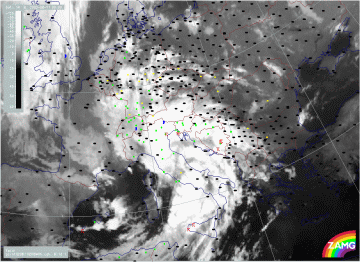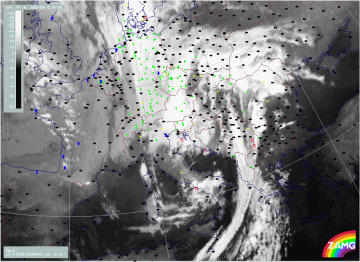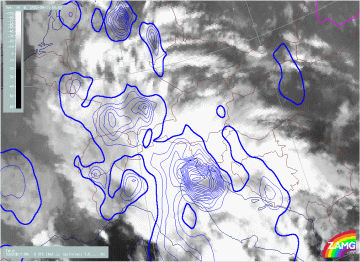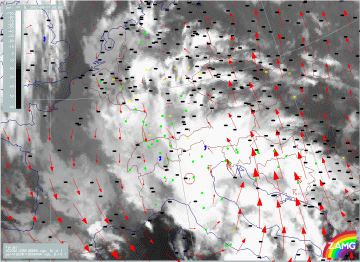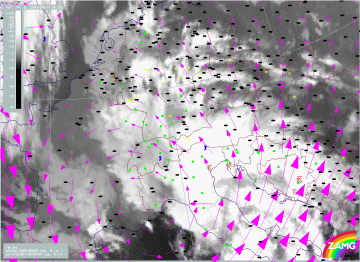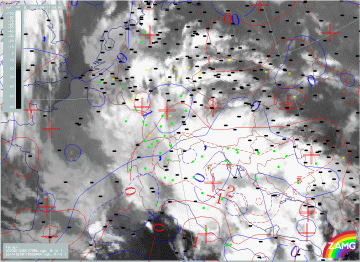Floodphase
Sequence of weather: Rain, and rain amounts
|
11 August 2002/00.00 UTC - Meteosat IR image; weather events (green: rain and showers, blue: drizzle, cyan: snow, red: thunderstorm with
precipitation, purple: freezing rain, orange: hail, black: no actual precipitation or thunderstorm with precipitation); 00.00 - 21.00
UTC 3-hourly image Loop
|
12 August 2002/00.00 UTC - Meteosat IR image; weather events (green: rain and showers, blue: drizzle, cyan: snow, red: thunderstorm with
precipitation, purple: freezing rain, orange: hail, black: no actual precipitation or thunderstorm with precipitation); 12 August/00.00
- 13 August/12.00 UTC 3-hourly image Loop
|
|
11 August 2002/00.00 UTC - Meteosat IR image; blue: 6-hourly precipitation amounts (thick line: 1mm, isoline distance: 4mm), magenta:
areas with insufficient data coverage; 11 August/00.00 - 13 August/18.00 UTC 6-hourly image Loop
|
|
At the beginning of the period (11 August 00.00 - 09.00 UTC) the precipitation is mainly concentrated over N. Italy and is associated with the second Wave which is developing into the 2nd Occlusion cloud band. Some precipitation is observed during this phase in W. Austria and later over Switzerland from the 1st Occlusion cloud band but the amounts are rather low.
In a second phase (11 August/12.00 - 18.00 UTC) the precipitation spreads over the whole Austria and is clearly associated with the 2nd Occlusion cloud band. From there, the precipitation extends to Slovakia and the Czech Republic with high amounts caused by Stau effects. A separate maximum of precipitation, over Hungary in this phase, is associated with the 2nd low within the Occlusion cloud band developing from a 3rd Wave (Croatia).
In the time frame from 12 August/00.00 - 06.00 UTC, in addition to the already mentioned countries, pronounced precipitation starts and remains over East Germany, while the neighbouring countries of Hungary, Slovenia and Slovakia now have lower amounts of precipitation.
In the time phase 12 - 13 August, precipitation amounts remain high over East Germany, W. Czech Republic and very high over N. Austria (Salzburg, Upper and Lower Austria).
Relationships between precipitation and relevant parameters
Wind fields at 850 and 500 hPa
|
11 August 2002/00.00 UTC - Meteosat IR image; weather events (green: rain and showers, blue: drizzle, cyan: snow, red: thunderstorm with
precipitation, purple: freezing rain, orange: hail, black: no actual precipitation or thunderstorm with precipitation; red: wind
vectors at 850 hPa; 11 August/00.00 - 13 August/12.00 UTC 6-hourly image Loop
|
11 August 2002/00.00 UTC - Meteosat IR image; weather events (green: rain and showers, blue: drizzle, cyan: snow, red: thunderstorm with
precipitation, purple: freezing rain, orange: hail, black: no actual precipitation or thunderstorm with precipitation; magenta: wind
vectors at 500 hPa; 11 August/00.00 - 13 August/12.00 UTC 6-hourly image Loop
|
In both loops above the movement of the cyclonic vortex in the wind field from N. Italy across E. Austria and the Czech Republic to Poland can be observed very clearly. At 500 hPa the circulation is, initially, more to the W, over the W. Alps, and the displacement at this level is a bit more eastward than at the 850 level.
The distinct Stau effects at the Alps first start in the western part but very soon move to the eastern parts where they remain for the duration of this case.
Fields of divergence at 850 and 700 hPa
|
11 August 2002/00.00 UTC - Meteosat IR image; weather events (green: rain and showers, blue: drizzle,cyan: snow, red: thunderstorm with
precipitation, purple: freezing rain, orange: hail, black: no actual precipitation or thunderstorm with precipitation); blue: thermal
front parameter 500/850 hPa; red: divergence 850 hPa (red dashed: convergence); blue: divergence 700 hPa (blue dashed: convergence); 11
August/00.00 - 13 August/12.00 UTC 6-hourly image Loop
|
|
The fields of convergence at both levels show well marked maxima with extraordinarily high values. The movement of the maxima is similar to that already seen in the fields: from W. Austria to E. Austria and then northward to the Czech Republic and S. Poland. They agree very well with the precipitation areas.
